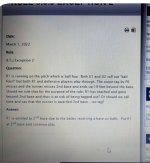VTJGball
Well-known member
To my understanding, he explained it to the coach that it bounced off the fence and went back in fair territory before 1st base so it is a fair ball.Once it hits anything other than the ground in foul territory, it is foul (or caught if it is caught in the air).
once it hits the ground beyond the base (1st or 3rd) it is also foul.
The only thing that wouldn’t kill it is if it hits the ground only before the base bc it could still bounce/roll/spin it’s way back into fair territory if untouched.
Did the umpire not realize it hit the fence/pole?
I watched it on video and I can't see how he could have seen anything different than that.



